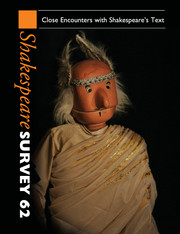Book contents
- Frontmatter
- Shakespeare, text and paratext
- The popularity of Shakespeare in print
- The continuing importance of new Bibliographical method
- ‘Honour the real thing’: Shakespeare, Trauma and Titus Andronicus in South Africa
- ‘O, these encounterers’: on Shakespeare’s meetings and partings
- A play of modals: Grammar and potential action in early Shakespeare
- Merry, marry, Mary: Shakespearian wordplay and Twelfth Night
- A subtle point: Sleeves, tents and ‘Ariachne’s broken woof’ (again)
- The look of Othello
- Red button Shakespeare
- ‘Mark you / his absolute shall?’: Multitudinous tongues and contested words in Coriolanus
- Chagall’s Tempest: An autobiographical reading
- Reading illustrated editions: Methodology and the limits of interpretation
- Close encounters with Anne Brontë's Shakespeare
- Shakespeare and the magic lantern
- Shakespeare and the coconuts: close encounters in post-apartheid South Africa
- The Schrödinger effect: Reading and misreading performance
- Behind the scenes
- Inner monologues: Realist acting and/as Shakespearian performance text
- More japanized, casual and transgender shakespeares
- Translation futures: Shakespearians and the foreign text
- After translation
- ‘The single and peculiar life’: Hamlet’s heart and the early modern subject
- Mapping King Lear
- ‘Last on the stage’: The place of Shakespeare in Charles Darwin’s ethology
- Sense/memory/sense-memory: Reading narratives of Shakespearian rehearsals
- Shakespeare performances in England (and Wales), 2008
- Professional Shakespeare productions in the British Isles, January–December 2007
- The Year's Contributions to Shakespearian Study 1 Critical Studies
- 2 Shakespeare in performance
- 3a Editions and textual studies
- 3b Editions and textual studies
- Index to Volume 62
3b - Editions and textual studies
Published online by Cambridge University Press: 28 November 2009
- Frontmatter
- Shakespeare, text and paratext
- The popularity of Shakespeare in print
- The continuing importance of new Bibliographical method
- ‘Honour the real thing’: Shakespeare, Trauma and Titus Andronicus in South Africa
- ‘O, these encounterers’: on Shakespeare’s meetings and partings
- A play of modals: Grammar and potential action in early Shakespeare
- Merry, marry, Mary: Shakespearian wordplay and Twelfth Night
- A subtle point: Sleeves, tents and ‘Ariachne’s broken woof’ (again)
- The look of Othello
- Red button Shakespeare
- ‘Mark you / his absolute shall?’: Multitudinous tongues and contested words in Coriolanus
- Chagall’s Tempest: An autobiographical reading
- Reading illustrated editions: Methodology and the limits of interpretation
- Close encounters with Anne Brontë's Shakespeare
- Shakespeare and the magic lantern
- Shakespeare and the coconuts: close encounters in post-apartheid South Africa
- The Schrödinger effect: Reading and misreading performance
- Behind the scenes
- Inner monologues: Realist acting and/as Shakespearian performance text
- More japanized, casual and transgender shakespeares
- Translation futures: Shakespearians and the foreign text
- After translation
- ‘The single and peculiar life’: Hamlet’s heart and the early modern subject
- Mapping King Lear
- ‘Last on the stage’: The place of Shakespeare in Charles Darwin’s ethology
- Sense/memory/sense-memory: Reading narratives of Shakespearian rehearsals
- Shakespeare performances in England (and Wales), 2008
- Professional Shakespeare productions in the British Isles, January–December 2007
- The Year's Contributions to Shakespearian Study 1 Critical Studies
- 2 Shakespeare in performance
- 3a Editions and textual studies
- 3b Editions and textual studies
- Index to Volume 62
Summary
In reviewing The RSC Shakespeare, Jonathan Bate and Eric Rasmussen’s edition of the Complete Works (2007), in the TLS (17 August 2007), I complained that ‘the RSC-ness of The RSC Shakespeare is an invisible element’, for, apart from the title-page, a one-page foreword by the RSC’s Artistic Director, Michael Boyd, and a single insert of some photographs from RSC productions, there was no sign of the RSC’s work informing the edition. Now, with the appearance in 2008 of the first five volumes of individual plays in the series, there has been a distinct turn for the better.
Chosen in part to match the RSC’s 2008 repertory, the editions of (in F1 order) The Tempest, Love’s Labour’s Lost, A Midsummer Night’s Dream, Richard Ⅲ and Hamlet use the introductions, texts, commentary and collations from the Complete Works, unaltered as far as I have checked. But they add to them brief but deft ‘Overviews’ of each play’s stage-history by Jan Sewell, a more extended and well-researched examination of the play in performance at the RSC by Karin Brown and, probably most significantly, interviews with and, in some cases, an essay by actors, directors and designers who have been involved in productions, mostly, though not always, at the RSC. Richard III, for instance, has interviews with the actor Simon Russell Beale (Richard in 1992), the director Bill Alexander (1984) and the designer Tom Piper (2006) and an essay by Richard Eyre reflecting on his National Theatre production (1990), while Hamlet has interviews with Ron Daniels (RSC 1984 and 1989), John Caird (NT 2000) and Michael Boyd (RSC 2004).
- Type
- Chapter
- Information
- Shakespeare Survey , pp. 427 - 428Publisher: Cambridge University PressPrint publication year: 2009



